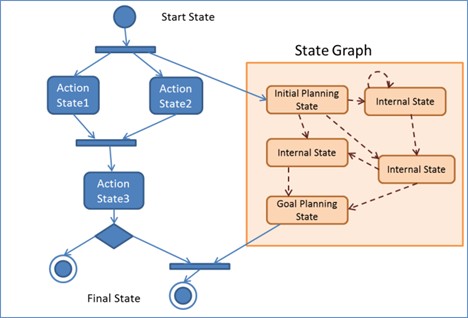The Development of Intelligent Case Management Systems

At the modern stage of development, the processes of document circulation and case management are well studied, and many software systems are successfully used to manage these processes. On the other hand, we are in the technological era of artificial intelligence, which opens up new opportunities for the developing existing information systems. The paper analyzes the weaknesses of modern case management systems and proposes ways to solve them using artificial intelligence methods. While case management processes are shaped by legislation and regulations, ambiguities in their interpretations, their incompleteness, and the challenges of analyzing related documents make it difficult to establish rigid case management schemes regularly. To achieve business goals, it is essential to implement dynamic schemes instead. Consequently, this paper presents the case management process using mixed models. Some aspects of the process are described as fixed workflows, while others are represented as dynamic, configurable processes that utilize established subprocesses, which require planned resolution.
Current case management systems generate valuable knowledge and experience when handling real data, enabling the automation of select processes and decision-making. However, such functionality is often lacking in existing systems. To address this issue, the paper discusses the expansion of the case management system with a unified intellectual module engine, which includes a knowledge base, mechanisms for working with rules, facts, drawing conclusions, machine learning, planning, and decision-making. The paper presents a formal meta-model of a case management system, which is designed as a transformation of case components—objects and initial states—into a target state through the selection of sequences of case management operations. In this context, the state is defined as a set of object attributes and their corresponding values, represented as facts within a knowledge base. The operations are detailed in the knowledge base in the form of rules. When a new situation arises in the case management process, it becomes necessary to re-plan the process. The model formulates the task of selecting the optimal sequence of actions, and the author proposes an algorithm to address this challenge. The architecture of the intelligent case management system has been developed based on the presented formalism, and its core components have been implemented. The system includes several key architectural components:
- Case Lifecycle Management Module: This module handles the creation, updating, and closure of cases.
- Hybrid Intelligent Module: Responsible for managing the knowledge base, this module incorporates machine learning, dynamic planning, and decision-making processes.
- Validation Module: This component ensures data consistency and accuracy through a combination of static, dynamic, and AI-enhanced validation rules.
- Configuration Module: This module manages the system's operational functions.
The system developed based on this architecture has been implemented in both government and private sector organizations across various fields.
Downloads
Metrics
No metrics found.
Bosikashvili Z., Kvartskhava G., [2024],Using Hybrid Models of AI for Identification of Trees by UAV Images of Forests: I. Machine-learning Component of the Models, WSEAS Transactions on Signal Processing,20,,39-53, https://doi.org/10.37394/232014.2024.20.5
Bosikashvili Z., [2014], Extansion of the Architecture of Software Systems with Artificial Intelligence Elements, Modern Computer Applications in Science and Education, Editor Constantin Buzatu,75-84, ISBN:978-960-474-363-6
Wang, P. [2013] “NON-AXIOMATIC LOGIC A Model of Intelligent Reasoning,” Copyright © 2013 by World Scientific Publishing Co. Pte. Ltd,2013
Bosikashvili Z., [2010] , The blocking meta-heuristics for combinatorial problems solving, The ACM Digital Library, World Scientific and Engineering Academy and Society (WSEAS) Stevens Point, Wisconsin, USA.
Russell, S. and Norvig, P. [2010] Artificial Intelligence: A Modern Approach, 3rdedn. (Prentice Hall, Upper Saddle River, New Jersey).
Steven M. LaValle. [2006]. Planning Algorithms. Published by Cambridge University Press
Wil M.P, Pallas Athena, [2002] Case Handling: A New Paradigm for Business Process Support, http://wwwis.win.tue.nl/~wvdaalst/publications/p252.pdf
Nilsson, N. J. [1991] “Logic and artificial intelligence,” Artificial Intelligence 47,31–56.
Copyright (c) 2025 Georgian Scientists

This work is licensed under a Creative Commons Attribution-NonCommercial-NoDerivatives 4.0 International License.





